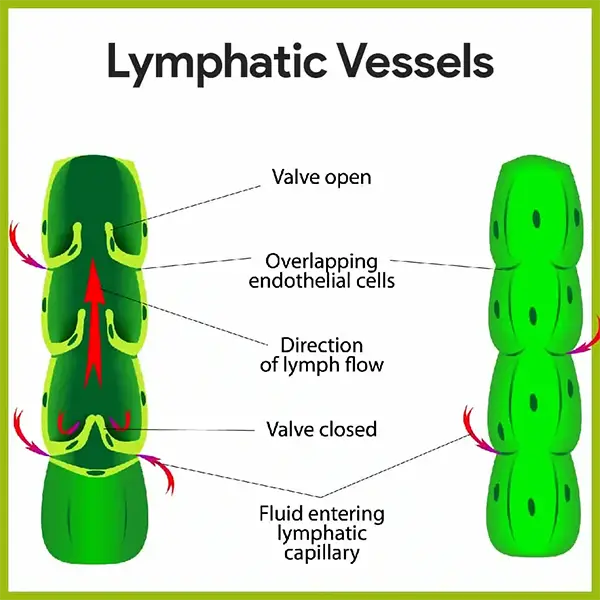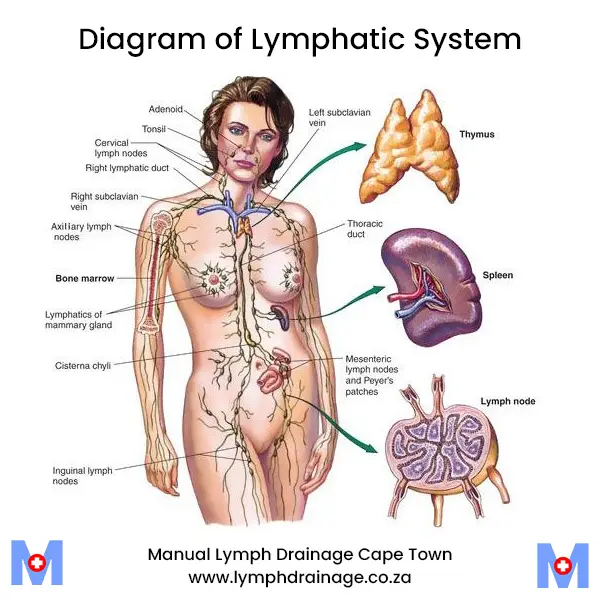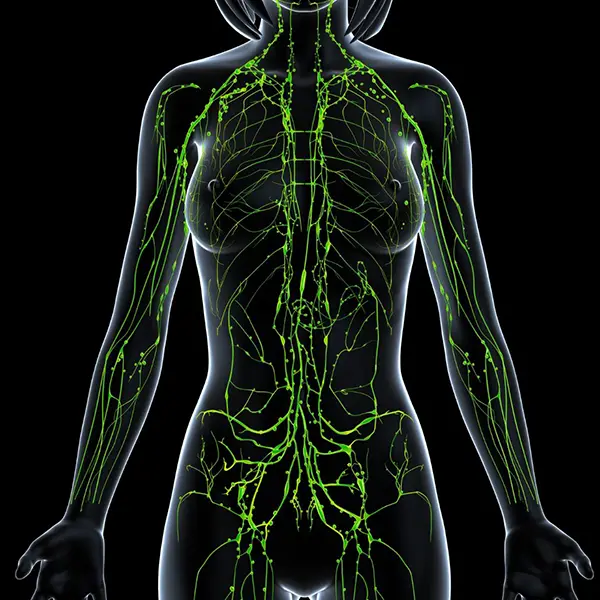For women in Cape Town considering or recovering from cosmetic surgery, understanding the body’s natural healing mechanisms is the first step toward achieving flawless results. While everyone focuses on the surgeon’s skill, the real star of your recovery story is a silent, intricate network known as the Lymphatic System. Far more than just a component of your immune defense, this system acts as your body’s sophisticated ‘Drainage Highway’—and keeping it clear is vital, especially after tissue manipulation. Here’s all you need to know about your body’s Lymphatic Anatomy.
The Anatomy of Your Drainage Highway: A Deeper Look
The lymphatic system is a vital part of the circulatory and immune systems, performing three critical roles: managing fluid balance, absorbing fats, and fighting infection. Unlike the cardiovascular system, which has the heart to pump blood, the lymphatic system has no central pump. Instead, it relies on movement, breathing, and muscle contraction to circulate its clear, yellowish fluid called lymph.

Key Components:
- Lymphatic Vessels and Capillaries: This is the highway network. These fine vessels begin as blind-ended sacs throughout your tissues, collecting approximately three liters of fluid daily that has leaked out of your blood capillaries. They contain one-way valves to prevent backflow, ensuring lymph always flows toward the heart.
- Lymph Nodes: These are the checkpoints or filtration stations. Shaped like tiny beans, you have hundreds clustered in areas like your neck, armpits (axilla), and groin (inguinal), all areas highly relevant to common cosmetic procedures. Inside the nodes, immune cells (lymphocytes) filter the lymph, destroying bacteria, viruses, and cellular debris before the fluid is returned to the bloodstream.
- Lymph: The fluid itself. It carries waste products, damaged cells, large proteins, and, critically for post-op healing, excess fluid and cellular debris resulting from trauma.
This drainage highway is essential for preventing the tissues from becoming waterlogged. When it functions optimally, your body stays clear of swelling, toxins, and inflammation.
What Exactly Is The Lymphatic System?
Your lymphatic system is a complex network of vessels, nodes, and organs that forms one of your body’s most important defense mechanisms. Unlike your cardiovascular system with its powerful heart pump, the lymphatic system relies on muscle movement, breathing, and manual manipulation to move fluid throughout your body.
The system comprises several key components that work together harmoniously. Lymph fluid itself is a clear, protein-rich liquid that travels through your body collecting cellular debris, bacteria, viruses, and waste products. This fluid originates from the spaces between your cells, where it absorbs excess fluid and proteins that have leaked from blood capillaries.
Lymphatic vessels serve as the highways for this transport system. These thin-walled tubes begin as tiny capillaries in your tissues, merging into progressively larger vessels that eventually connect to your bloodstream. The vessels contain one-way valves that prevent backflow, ensuring lymph moves in the correct direction toward your heart.
Scattered throughout these pathways are lymph nodes, small bean-shaped structures that act as filtering stations. Your body contains hundreds of these nodes, clustered in strategic locations like your neck, armpits, groin, chest, and abdomen. Inside each node, specialized immune cells screen the lymph fluid for foreign invaders, mounting an immune response when necessary. Primary lymphoid organs complete the picture. Your bone marrow produces lymphocytes, the white blood cells essential for immunity, while your thymus gland helps mature these cells. The spleen, though often overlooked, functions as a massive lymph node, filtering blood and removing old red blood cells while playing a crucial role in your immune response.
The Female Lymphatic System: Unique Considerations
Women’s bodies present specific lymphatic considerations, particularly in areas commonly targeted by cosmetic procedures. The breast tissue contains an extensive lymphatic network, with the majority of lymph draining toward the axillary (armpit) lymph nodes. This drainage pattern becomes especially relevant for women undergoing breast augmentation, breast reduction, or breast lift procedures.
The abdominal and pelvic regions also feature dense lymphatic networks. During procedures like tummy tucks or liposuction, this intricate system can be temporarily disrupted, leading to fluid accumulation and swelling. Understanding how your lymphatic system functions in these areas helps you appreciate why Post Op Care becomes so crucial for optimal healing. Your lymphatic system also responds to hormonal fluctuations throughout your menstrual cycle, pregnancy, and menopause. These natural variations can affect fluid retention and lymphatic flow, making personalized Manual Lymphatic Drainage treatments particularly beneficial for women’s overall wellness beyond surgical recovery.

How Plastic Surgery Affects Your Lymphatic System
When you undergo plastic surgery procedures, your lymphatic system faces significant challenges. Surgical trauma, while controlled and intentional, creates substantial disruption to your body’s delicate drainage network.
During procedures like liposuction, the suction process removes fat cells but also temporarily damages lymphatic vessels and capillaries in the treatment area. Your body interprets this as trauma, triggering an inflammatory response. Blood vessels become more permeable, allowing fluid and proteins to leak into surrounding tissues. Without functioning lymphatic vessels to drain this excess fluid efficiently, swelling accumulates.
Tummy tucks involve even more extensive disruption. The procedure requires lifting large sections of skin and tissue, cutting through multiple layers that contain lymphatic vessels. Your surgeon must work around or through these vessels to achieve the desired contour, temporarily interrupting normal drainage patterns. The body responds by forming new lymphatic connections, but this regeneration takes time.
Breast procedures present their own unique challenges. Whether you’re having an augmentation, reduction, or lift, surgery disrupts the natural lymphatic drainage pathways that run from breast tissue toward the axillary lymph nodes. The placement of implants or removal of tissue redirects normal flow patterns, while surgical incisions cut through lymphatic vessels that must eventually reconnect and heal.
Brazilian Butt Lifts combine both fat removal and fat transfer, creating a double impact on your lymphatic system. The liposuction donor sites experience vessel disruption, while the buttock area receiving transferred fat must establish new blood supply and lymphatic drainage for the grafted tissue to survive and integrate properly.
This surgical trauma initiates a cascade of healing processes. Your body floods the area with immune cells, growth factors, and proteins necessary for repair. While essential for healing, this response also contributes to inflammation and swelling. Without proper drainage, this fluid accumulates, creating the puffy, uncomfortable sensation many women experience after cosmetic surgery procedures. The accumulation of lymphatic fluid, medically termed lymphedema, can persist for weeks or even months after surgery if left unmanaged. This stagnant fluid creates an ideal environment for fibrosis, the formation of hard, fibrous scar tissue that can compromise your surgical results. Worse still, prolonged swelling delays healing, increases discomfort, and may lead to complications like seromas (fluid pockets) or infections.
Enter Manual Lymphatic Drainage: Your Recovery Accelerator
This is precisely where specialized Manual Lymph Drainage Cape Town becomes invaluable. Manual Lymphatic Drainage, or MLD, is a gentle yet highly systematic massage technique specifically designed to stimulate lymphatic flow and reduce post-surgical swelling.
Unlike traditional massage that applies firm pressure to muscles, MLD uses light, rhythmic strokes that follow the natural pathways of your lymphatic system. The technique employs specific hand movements that stretch the skin in the direction of lymph flow, creating a pumping effect that encourages stagnant fluid to move toward functioning lymph nodes where it can be processed and eliminated.
The science behind MLD is compelling. The gentle pressure and specific stroke patterns increase the activity of lymphatic vessel contractions, essentially jump-starting your body’s natural drainage system. This mechanical stimulation also helps redirect lymph fluid around areas of surgical disruption, utilizing alternative pathways to maintain flow while damaged vessels regenerate.
For women who’ve undergone plastic surgery, the benefits of Post Op Lymphatic Drainage extend far beyond simple swelling reduction. By clearing excess fluid and inflammatory mediators from the surgical site, MLD significantly reduces discomfort and that tight, heavy sensation that characterizes post-operative swelling. Many women report feeling lighter and more comfortable after just one session.
Perhaps most importantly for your final results, consistent Manual Lymphatic Drainage helps prevent the formation of fibrotic tissue. By maintaining fluid movement and preventing stagnation, MLD reduces the likelihood of lumps, bumps, and hard areas developing in treated zones. This translates directly to smoother, more natural-looking contours. The benefits multiply with proper timing and frequency. Starting MLD sessions as soon as your surgeon approves (typically within days of surgery) capitalizes on your body’s most intensive healing phase. Regular sessions throughout your recovery period maintain momentum, preventing fluid reaccumulation and supporting optimal healing.
Why Choose Manual Lymph Drainage Cape Town?
At Manual Lymph Drainage Cape Town, we’ve built our reputation on understanding the intricate relationship between the female lymphatic system and cosmetic surgery outcomes. Led by The Massage Guy – Cape Town, a renowned specialist in Post Op Lymphatic Drainage, our services are tailored exclusively for women navigating their surgical journey.
Our expertise spans the full spectrum of popular procedures: liposuction, tummy tucks, breast augmentation, breast reduction, breast lifts, Brazilian Butt Lifts, and Mommy Makeovers. We understand that each procedure affects the lymphatic system differently, and we adjust our technique accordingly to address your specific needs.
What truly sets our service apart is convenience during your most vulnerable recovery period. We recognize that travelling while sore, bruised, and swollen after Plastic Surgery Cape Town procedures can feel nearly impossible. That’s why we bring specialized Manual Lymph Drainage Cape Town care directly to you. Whether you’re recovering in a hotel or resting at home, our therapist travels to your location, allowing you to focus entirely on healing in comfortable, familiar surroundings. Our pre-operative MLD services prepare your body for surgery by optimizing lymphatic flow before your procedure. This preparation creates an ideal environment at incision sites by clearing excess fluids and cellular debris, potentially leading to neater scars and smoother incisions. The calming nature of the massage also helps alleviate pre-surgery anxiety, helping you approach your procedure in a more relaxed state.
Beyond Surgery: Lymphatic Drainage for General Wellness
While our specialty lies in Post Op Care, Manual Lymphatic Drainage offers powerful benefits for women seeking general wellness improvements. Our treatments provide an effective, natural solution for body detoxification, helping your system eliminate accumulated toxins and metabolic waste.
Many Cape Town women also discover that regular Manual Lymph Drainage Cape Town sessions can reduce the appearance of cellulite. By improving lymphatic circulation and reducing fluid retention in affected areas, MLD helps smooth skin texture and diminish that dimpled appearance that troubles so many women. The immune-boosting properties of lymphatic drainage shouldn’t be overlooked either. By enhancing your body’s natural filtration and defense mechanisms, regular sessions support overall health and resilience, helping you feel energized and vibrant.

Your Lymphatic System Deserves Expert Care
Your lymphatic system works tirelessly to protect, cleanse, and maintain your body’s delicate balance. When you invest in Cosmetic Surgery in Cape Town to enhance your appearance and confidence, supporting this vital system through specialized Manual Lymphatic Drainage becomes essential for achieving the beautiful results you deserve.
Whether you’re preparing for an upcoming procedure, currently recovering, or simply seeking to optimize your body’s natural detoxification processes, Manual Lymph Drainage Cape Town stands ready to support your journey. With expert knowledge, specialized techniques, and the convenience of outcall services, bringing our expert MLD specialist right to your home or hotel room in Cape Town, we make it easy for Cape Town women to prioritize their lymphatic health and recovery. Your body’s drainage highway deserves expert navigation. Let us guide you toward optimal healing, comfort, and results that exceed your expectations.
We offer specialized MLD treatments tailored for all major procedures, including MLD for Liposuction, Tummy Tuck, Breast Augmentation/Reduction/Lift, Brazilian Butt Lift (BBL), and Mommy Makeovers. Furthermore, our services extend to women seeking general wellness, Cellulite Reduction, and relief from swelling during Pregnancy & Postpartum Healing.
Ready to ensure your recovery is flawless? Contact us today to secure your essential MLD appointments.


